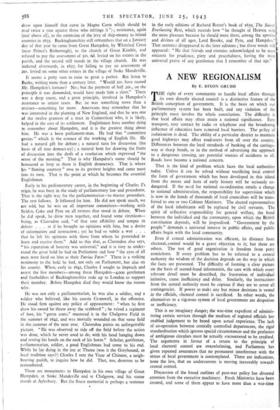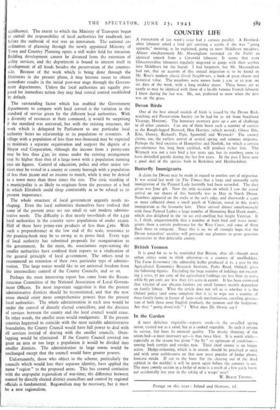A NEW REGIONALISM
By E. DIXON GRUBB
That is the kind of problem which faces the local authorities today. Unless it can be solved without sacrificing local control the form of government which has been developed in this island from the moots and Teets of early history will be seriously en- dangered. If the need for national co-ordination entails a change to national administration, the responsibility for supervision which is now in the hands of thousands of local councillors will be trans- ferred to one or two Cabinet Ministers. The elected representatives of the local inhabitants will be replaced by civil servants. The spirit of collective responsibility for general welfare, the bond between the individual and the community, upon which the British constitution depends, will be jeopardised. " Government by the people" demands a universal interest in public affairs, and public affairs begin with the local community.
Even if central administration was efficient, its distance from electoral..control would be a grave objection to it; but there are others. The test of good organisation is freedom from petty restrictions. If every problem has to be referred to a central authority the wisdom of the decision depends on the way in which the facts are presented. The difficulty of forming a clear picture on the basis of second-hand information, the care with which every relevant detail must be described, the frustration of individual initiative, cause inefficiency and delay. Similarly, the instructions from the central authority must be copious if they are to cover all contingencies. If power to make any but minor decisions is vested in the officials, electoral control is sacrificed. In other words, the alternatives to a vigorous system of local government are despotism or inefficiency.
This is no imaginary danger; the war-time expedient of adminis- tering certain services through the medium of regional officials has enabled judgement to be based upon actual experience. The lack of co-operation between centrally controlled departments, the rigid standardisation which ignores special circumstances and the profusion of ambiguous circulars must be actually encountered to be credited. The arguments in favour of a return to the principle of local electoral control are overwhelming, and Parliament has given repeated assurances that no permanent interference with the status of local government is contemplated. There are indications, none the less, that an undercurrent is moving inexorably towards central control.
Discussion of the broad outlines of post-war policy has diverted attention from the executive machinery. Fresh Ministries have been created, and some of them appear to have more than a war-time significance. The extent to which the Ministry of Transport began to curtail the responsibility of local authorities for roadwork just before the outbreak of war was an innovation. The national co- ordination of planning through the newly appointed Ministry of Town and Country Planning opens a still wider field for intrusion. Building development cannot be divorced from the extension of utility services, and the department is bound to interest itself in development of all kinds besides the preservation of the country- side. Because of the work which is being done through the Ministries in the present phase, it may become easier to obtain immediate results in the initial post-war stage through the Govern- ment departments. Unless the local authorities are equally pre- pared for immediate action they may find central control established by default.
The outstanding factor which has enabled the Government departments to compete with local control is the variation in the standard of service given by the different local authorities. With a diversity of resources at their command, it would be surprising if the standard was universal; but with the existing structure, the work which is delegated by Parliament to any particular local authority bears no relationship to its population or resources. A village with a population of less than two thousand may be expected to maintain a separate organisation and support the dignity of a Mayor and Corporation, although the income from a penny-rate may be less than L50; • its status under the existing arrangement may be higher than that of a large town with a population running into six figures. Control of education, police and other major ser- vices may be vested in a county or county borough with a population of less than 3o,000 and an income to match, while it may be denied to a town more than three times the size. The civic standing of a municipality is as likely to originate from the presence of a bed in which Elizabeth could sleep comfortably as to be related to its present importance.
The whole structure of local government urgently needs re- shaping. Even the local authorities themselves have realised that some of the present areas are too small to suit modern adminis- trative needs. The difficulty is that nearly two-thirds of the 1,530 local authorities in the country serve populations of under 20,000. Half of these have penny-rate products of less than L160. With such a preponderance at the low end of the scale, resistance to the pruning-hook may be so strong as to prove fatal. Every type of local authority has submitted proposals for reorganisation to the government. In the main, the associations representing the smaller authorities have confined their reports to a vindication of the general principle of local government. The others tend to recommend an extension of their own particular type of adminis- tration. The large towns would like to see universal freedom from the intermediate control of the County Councils, and so on.
Perhaps the most interesting report has come from the Recon- struction Committee of the National Association of Local Govern- ment Officers. Its most important suggestion is that the present administrative districts should be reconstituted, and that the new areas should enjoy more comprehensive powers than the present local authorities. The whole administration in each area would be under the control of directly elected councillors, and the division of services between the county and the local council would cease. In other words, the smaller areas would amalgamate. If the present counties happened to coincide with the most suitable administrative boundaries, the County Council would have full power to deal with all services instead of sharing with the smaller councils. Over- lapping would be eliminated. If the County Council covered too great an area or too large a population it would be divided into smaller districts. The administration in large towns would be unchanged except that the council would have greater powers.
Unfortunately, those who object to the scheme, particularly the councils which would lose their separate identity, have applied the name "region" to the proposed areas. This has created confusion with the unpopular regionalism of war-time; the difference between control by directly elected district councillors and control by regional officials is fundamental. Regionalism may be necessary, but it must be a new regionalism.































 Previous page
Previous page